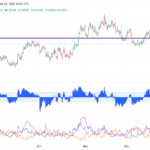With the UK being caught in the crossfire of Trump’s new tariff, what does its retail market and currency have to lose?
 The UK’s pound sterling has slumped against the dollar recently, solidifying the Bank of England’s Financial Policy Committee’s (FPC) warning that the recent shift in global trades could harm financial stability in the country. The US has been on a roll in 2025, starting a tariff war with several world leaders. The tariff war is easily one of its most daring moves. The imposition of these fees from the US has stemmed the risk of further global recession, and the UK is currently one of the countries receiving them. The GBP slump isn’t the only expected consequence, as retail markets also stand to lose a lot if the UK fails to move.
The UK’s pound sterling has slumped against the dollar recently, solidifying the Bank of England’s Financial Policy Committee’s (FPC) warning that the recent shift in global trades could harm financial stability in the country. The US has been on a roll in 2025, starting a tariff war with several world leaders. The tariff war is easily one of its most daring moves. The imposition of these fees from the US has stemmed the risk of further global recession, and the UK is currently one of the countries receiving them. The GBP slump isn’t the only expected consequence, as retail markets also stand to lose a lot if the UK fails to move.
The global tariff war and what’s changing
The conversation on raising tariffs has been the focal point since Donald Trump’s presidential campaign, where he pledged to impose a 10-60% increase on all US imports. In the beginning, most of the heat was on China and the EU, given that they had been mentioned a few times in this discussion. It’s also worth noting that Trump is no stranger to tariff wars, as he launched a trade war against China during his first term, imposing taxes on most of its goods. On his first day in office, he said a 25% tariff on Mexico and Canada was on the horizon, starting February 1. It has been a roller coaster since then, with Trump raising tariffs for several countries and locations, including the EU, Japan, India, the UK amongst many others. Several countries have also promised retaliatory measures. On April 9, President Trump dramatically made a U-turn after the United States came under heat on shaky trade deals with nearly 90 countries.
The president changed his position on Wednesday, pausing the reciprocal tariffs by 90 days for most countries, with one exception, China. However, while this persists, the 10% fee on UK exports to the country remains in place. At the same time, the pause does not extend to industry-specific tariffs, such as the 25% additional imposition on the UK’s steel, aluminium, and auto imports. Given that the United Kingdom exported £11.3 billion to the United States in January 2025, and its most prominent industries in this trade are cars and machinery, these tariff reforms might pose a significant economic problem.
How will the UK retail market react?
 At the time of writing, the UK hadn’t announced any retaliatory tariffs, so US imports remain the same in price. The same cannot be said for the UK. With tariffs at a record high, companies must find alternative ways to combat these additional costs. A lot could go wrong; the costs of transporting goods would skyrocket, and their potential trade partners may begin to source alternatives in countries with no tariffs or subsidies. In most cases, consumers bear the brunt of these changes because companies review the prices of goods in relation to their expenditures, which usually means an increase.
At the time of writing, the UK hadn’t announced any retaliatory tariffs, so US imports remain the same in price. The same cannot be said for the UK. With tariffs at a record high, companies must find alternative ways to combat these additional costs. A lot could go wrong; the costs of transporting goods would skyrocket, and their potential trade partners may begin to source alternatives in countries with no tariffs or subsidies. In most cases, consumers bear the brunt of these changes because companies review the prices of goods in relation to their expenditures, which usually means an increase.
Such situations are often the easiest route to inflation. At the same time, if the UK decides to mount retaliatory measures, those relying on US imports will also be affected. The employment market and workers’ wages are also greatly threatened. If companies cannot achieve balance by increasing prices, they might look for labour cuts to reach equilibrium. Whichever way you look at it, consumers and retailers will most certainly be affected.
Pound sterling slump
 Analysts at JPMorgan believe that the rapid escalation of trade war between China and the US, with other countries on the slide line, is enough to push global economies into a recession. This reality is already playing out in several investment markets, with stocks plummeting and currencies underperforming. The GBP has slumped against its major pairs, according to TradingView and other investment platforms. This depreciation reflects investor concerns about the UK’s economic outlook amid escalating trade tensions. If the pound value continues to decline, it could spill into more inflationary pressures.
Analysts at JPMorgan believe that the rapid escalation of trade war between China and the US, with other countries on the slide line, is enough to push global economies into a recession. This reality is already playing out in several investment markets, with stocks plummeting and currencies underperforming. The GBP has slumped against its major pairs, according to TradingView and other investment platforms. This depreciation reflects investor concerns about the UK’s economic outlook amid escalating trade tensions. If the pound value continues to decline, it could spill into more inflationary pressures.
A weaker pound not only slows down foreign investments but also makes imports more expensive, contributing to inflationary pressures. This scenario could lead to higher consumer prices and complicate the Bank of England’s monetary policy decisions. These negatives also threaten further recession for the UK economy. Economists warn that the tariffs could suppress the country’s growth, increasing the risk of a recession. The combination of higher consumer prices, disrupted trade, currency and financial market instability surely contributes to this risk.
Policy response will be crucial
While the US decisions on tariffs remain unpredictable, negotiations to reduce them are necessary. However, it is also worth noting that the likelihood of completely eliminating these tariffs is low. With the US maintaining tariffs on industries crucial to the UK’s trade, it’s evident that the UK needs to implement stronger policy reforms to counter these changes.





















